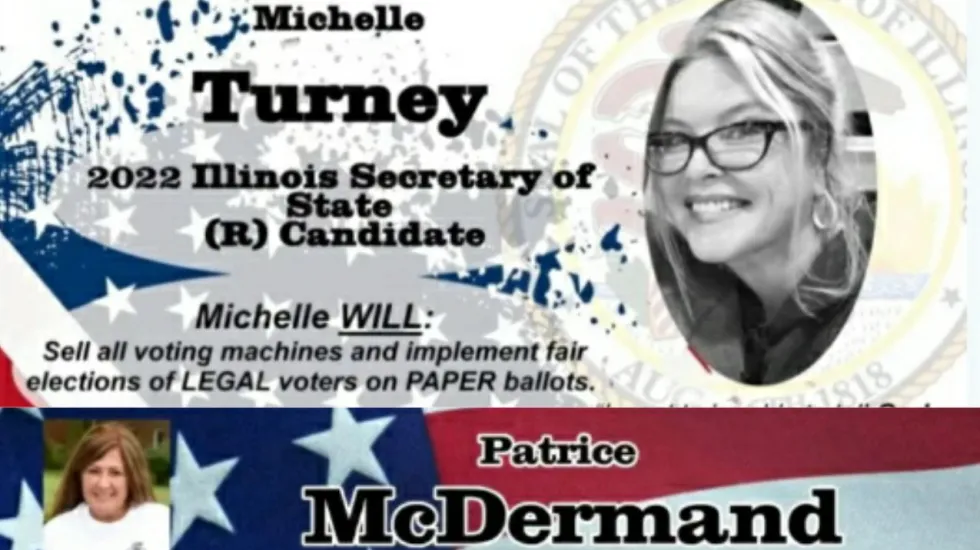
A suburban high school staffer. A former Chicago Police sergeant. A South Side college professor.
None of them believe the 2020 election results were legitimate. Some of them seem to promote the spread of much darker conspiracy theories even more detached from reality — namely, that a global cabal of Satanic pedophiles plotted to prevent former President Donald Trump from winning a second term.
And they all want your vote.
A slate of far-right conspiracy theorists have filed to run in June’s Republican primary for nominations for Illinois public offices ranging from governor to a seat in Congress, aiming to amplify baseless claims of rampant voter fraud and to “take back” the government.
Their website features a slogan and symbol linked to QAnon supporters, although one of the candidates sought to downplay the connection.
There’s no guarantee any of the seven extreme candidates will end up on the ballot for GOP nominations, but their entry into the race again raises the specter of Trump-backed election myths that have put Illinois Republicans in a bind as they try to win over moderate voters.
Those middle-of-the-road residents hardly seem to be the target of the candidates running under the banner of “We Are The People Illinois.”
“I don’t have to ‘campaign in Trump’s Shadow’ like the other GOP Candidates running against [Gov. J.B.] Pritzker,” reads an online campaign flyer for Wheaton gubernatorial candidate Emily Johnson, running on the group’s slate. “On the contrary, I will campaign with Trump and stand beside him as we fix the fraudulent election.”
Trump’s fraud claims have proven nearly completely unfounded.
Matt Dietrich, spokesman for the Illinois State Board of Elections, noted the state’s only bonafide fraud allegations from the 2020 election involved five people now facing felony charges.
“Illinois election law contains rigorous requirements for public testing of election equipment, the secure handling and tabulation of all ballots and maintenance of accurate voter rolls by the state’s 108 local election authorities,” Dietrich said. “Voters in Illinois should have complete confidence in the integrity of their election system from registration through the counting of ballots.”
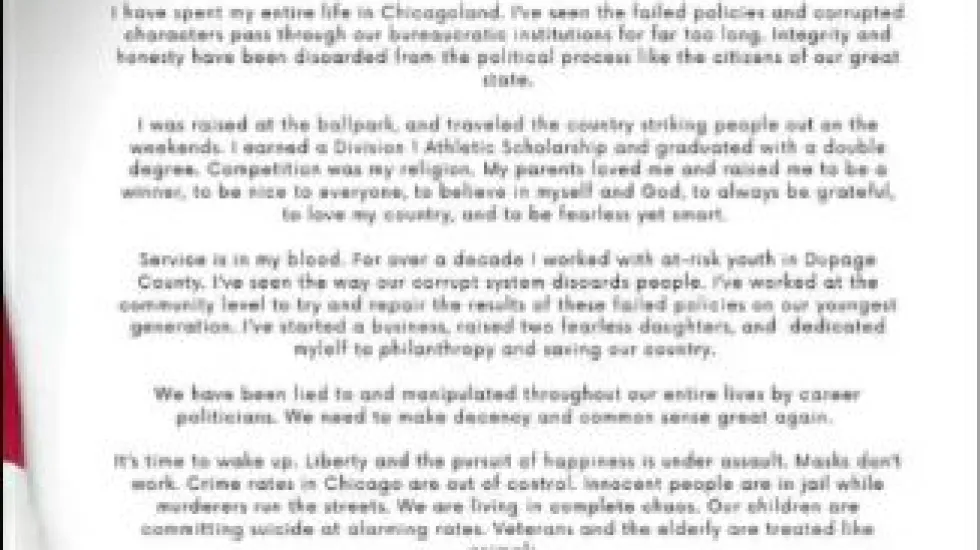
But Johnson’s campaigning on the anti-election fraud platform with running mate Brett Mahlen, her lieutenant governor candidate who, according to state records, shares an Orland Park address with Maryann Mahlen. She’s running to take Democratic U.S. Sen. Tammy Duckworth’s seat.
Maryann Mahlen’s candidate biography touts her “pursuit of bringing control of the land of the United States back to We The People, by re-establishing the Constitution for the United States of America.”
Those candidates couldn’t be reached for comment. Nor could Carol Stream resident Michael Kinney, who’s running for comptroller.
The website they all share indicates they came together online “to investigate the fraud in the 2020 election” and “take back their government from those who have usurped their positions through unlawful means.”
Secretary of state candidate Michelle Turney — a former police sergeant from the Beverly neighborhood — said in an email that her first priority would be to “decertify the 2020 Election on day one of my term.”
Turney, who has more than a thousand YouTube followers, also wrote that all “voting machines will be disassembled, sold, donated, or destroyed.” She’s no longer on the city payroll.
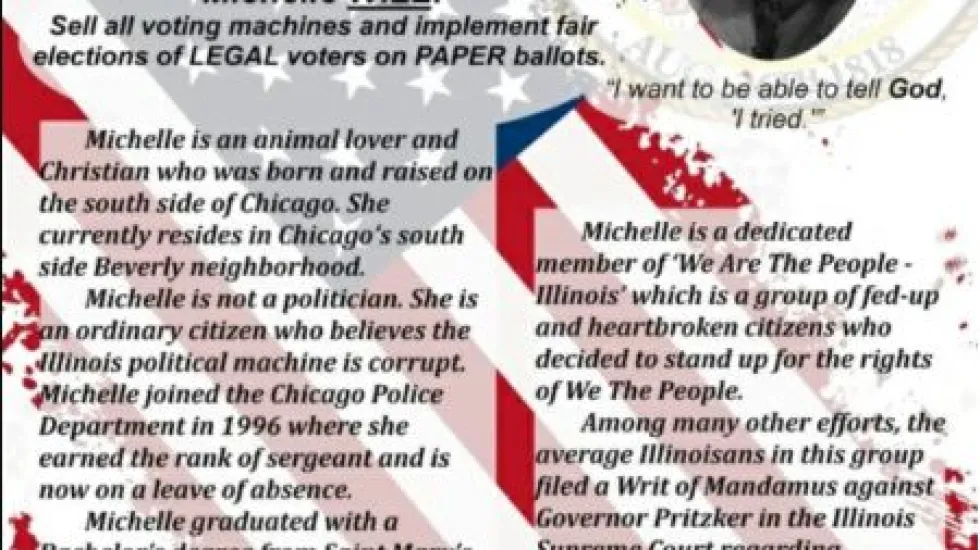
State records show Turney is the only one of the fringe candidates to launch a political fundraising committee, which she did in January with the stated purpose to “gain access to voter rolls” — and then deactivated it within a month. None of the candidates have reported any political contributions.
At the bottom of Turney’s campaign flyer is a slogan and image referencing Terpsichore Maras-Lindeman, a podcaster who ascribes to the far-reaching conspiracy theories collectively referred to as QAnon that have been embraced by many Trump supporters.
The Southern Poverty Law Center describes QAnon as “the umbrella term for a sprawling spiderweb of right-wing internet conspiracy theories with antisemitic and anti-LGBTQ elements that falsely claim the world is run by a secret cabal of pedophiles who worship Satan and are plotting against President Trump.”
Turney said in an email that her priorities “do not include Qanon. I do not know who Qanon is.” She suggested the slogan and image referencing the QAnon podcaster were added without her knowledge by “the company who volunteered to create my bio flyer.” That company couldn’t be reached for comment.
The slogan and image also appear on the flyer for state treasurer candidate Patrice McDermand, a Lake Bluff resident who is listed as an assistant in the dean’s office at Lake Forest High School.
In an email, McDermand declined to comment on her campaign or the flyer until “we are officially on the ballot.”
Johnson, Brett and Maryann Mahlen, Turney, Kinney and McDermand all filed their nominating petitions with the state election board on Wednesday to run in the GOP primary.
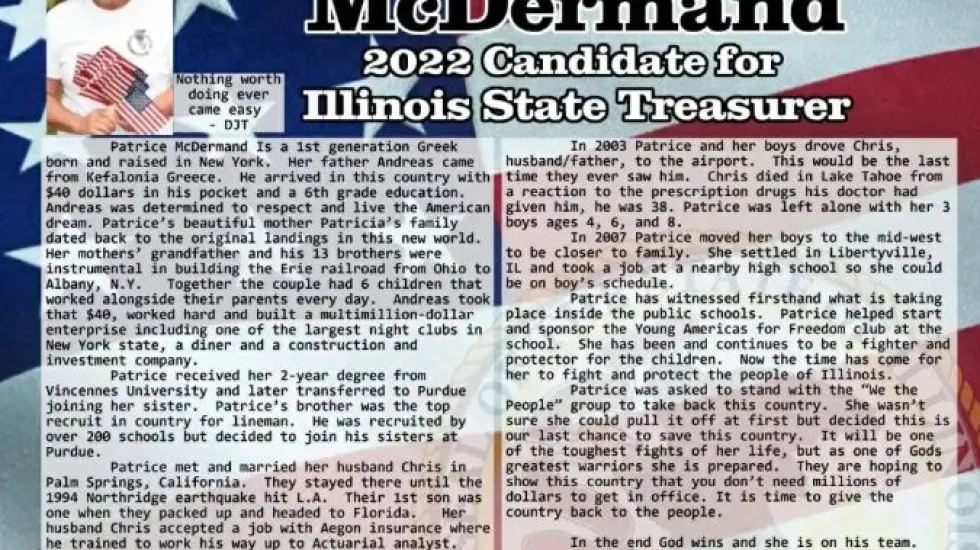
The candidates for statewide office had to collect at least 3,250 signatures to file for a spot on the Republican ballot. Candidates for the U.S. House have to collect 400 signatures.
Records show a handful of people have filed requests to review the candidates’ petitions, which is often a precursor to legal challenges to knock them off the ballot.
Opponents have until March 21 to file a challenge. The list of candidates appearing on the ballot will be finalized April 21 ahead of the June 28 primary.
Also running on the “We Are The People Illinois” ticket is Jeffrey English, who is listed as an assistant professor at St. Xavier University’s Graham School of Management.
English hasn’t yet formally filed petitions to run, but says in his flyer that he’s vying for the 14th Congressional District seat held by Democratic Rep. Lauren Underwood — and that he “believes that valid questions exist regarding the source of the COVID pandemic.”
In a series of emails, English declined to comment on his campaign, but he closed one message with a slogan often shared by QAnon followers.
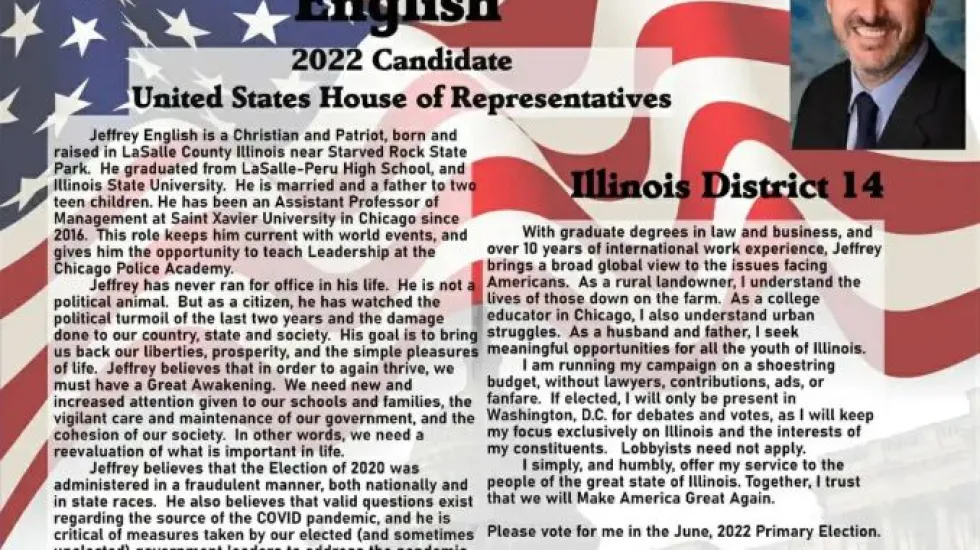
David Goldenberg, Midwest Regional Director of the Anti-Defamation League, said his organization is trying to track QAnon candidates running for office nationwide, a group that likely numbers in the hundreds.
“It’s a dangerous testament to how these extremist views and misinformation campaigns are seeping into politics and public policy,” Goldenberg said. “When we think about those who ascribe to these beliefs, they’re anti-Semitic, racist, xenophobic. … Political parties need to categorically reject these types of extremist views within their own party.”
A spokesperson for downstate venture capitalist Jesse Sullivan’s Republican gubernatorial campaign said they weren’t aware of his new far-right opponent and declined to comment.
Campaigns for the other four GOP governor hopefuls — Aurora Mayor Richard Irvin, Xenia state Sen. Darren Bailey, Bull Valley entrepreneur Gary Rabine and former Waterloo state Sen. Paul Schimpf — ignored repeated requests for comment on the views espoused by the “We Are The People” slate. So did a spokesman for the Illinois Republican Party.
Jake Lewis, spokesman for the state Democratic Party, called it “another example of just how far down the Donald Trump rabbit hole the Illinois Republican Party has fallen.”







